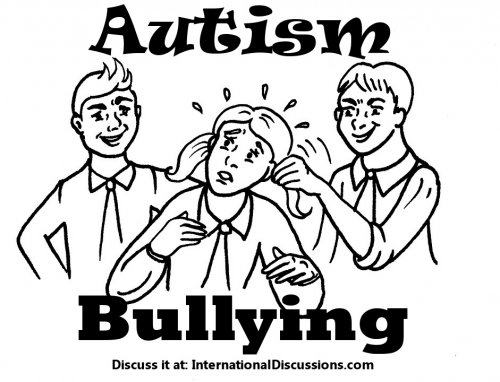 Close Topic Options
Close Topic OptionsAutism & Bullying
Autism Bullying - Psychology, Special Needs, Health - Posted: 20th Feb, 2019 - 6:26pm
Autism & Bullying
Autism & Bullying
Kayden Culp of Kerrville, Texas, has burns over 20 percent of his body from his ears to his belly button, and his organs are failing, according to a YouCaring page set up by the boy’s family to cover his health care expenses. Ref. Source 6c.

Autism & Bullying (Hover)
Bullying and Autism
Why children with autism may be at increased risk of bullying. Children with autism may be at greater risk of bullying because they are more willing to accept unfair behavior, say psychologists. Children played trading games with a puppet and those with autism were 37 percent less likely to reciprocate fair offers and three times more likely to accept unfair offers of just one sticker. They may be particularly susceptible to bullies exploiting their lower concern for personal gain and their increased tolerance of unfair behavior. Source 6u.
Someone commented...
Autism & Bullying
Name: Finnuval
Comments: As someone diagnosed as being on the spectrum I can say a thing or two about this…
I'm 39yo and can function pretty well, if you'd meet me in passing you would never know I was autistic.
First let me start by saying I wasn't diagnosed until my late 20's.
Large part of that was because back in the day autism wasn't considered a spectrum-disorder… you either acted as rain man and thus were autistic or you were just being difficult and hard to handle.
Now I was bullied from day one relentlessly up until I was 17yo, so every day in school was hel. The only safe-haven I knew was home.
My mother thankfully knew I was different and it was not me just being difficult. She did the best she could in a world without understanding and it saved my life.
Now I could go on about bullying and all that is wrong with that, but that's not the point I want to make here, instead I want to say something about what it means to be bullied as someone on the spectrum and the added difficulties that brings :
What people need to realize is that it is allready a struggle to understand and experience the most basic of social interactions and emotional interactions.
Trying to explain these things to me is like trying to tell a colorblind person what the color blue looks like. Only through dedication, patience and experience have I come to a place in my life where I understand the basics of these things, though they are more like a proxy then the real thing.
I'll know when I should cry and why but that doesn't mean I can. I'll know how to react to someone, what I need to do to be understood and liked and how to respond to someone's interactions, yet regularly still fail at them. At all times however I experience it as something I am doing not as something that comes natural, it takes a lot of effort to act 'normal' and I pull it of but it is an act.
And that is not just because of my autism it is also because of me being bullied, and this is why;
As anyone who has experience with dealing with people on the spectrum can tell you, we are hard to convince. Changing our mind is near impossible at best and needs a lot of effort on both parts (And usually tangible proof as well). So not only have I faced the struggle of understanding something that is alien to me, social and emotional interactions, I had to face another struggle ; convincing myself these 'social rules' are true… A huge battle as at every turn my brain tells me… wait, but that is not what I've experienced. I experienced it is normal and accepted to punch someone in the face if you don't like them, it's okay to call someone names because they are different…
That has made understanding all of it twice as hard! It also resulted in me not liking people very much and not wanting to have any social-connections, driving me into a form of self-chosen isolation on top of the isolation anyone on the spectrum already experiences.
I am only now slowly crawling out of that place but it is, and always will be, a struggle against my own brain.
Of course not all of us are the same and there are many differences on the spectrum, but this is my tale and I thought I'd share it so that those seeking to understand can understand just that little bit more.
Autism & Bullying
Children with autism more likely to face maltreatment, study finds. A recent study of 11 counties in Middle Tennessee revealed that children with autism spectrum disorder (ASD) were nearly 2.5 times more likely than children without ASD to be reported to the Child Abuse Hotline by the age of 8. Source 2k.
 TOPIC: Autism & Bullying
TOPIC: Autism & Bullying Bullies take advantage of those who are autistic
Bullies take advantage of those who are autistic